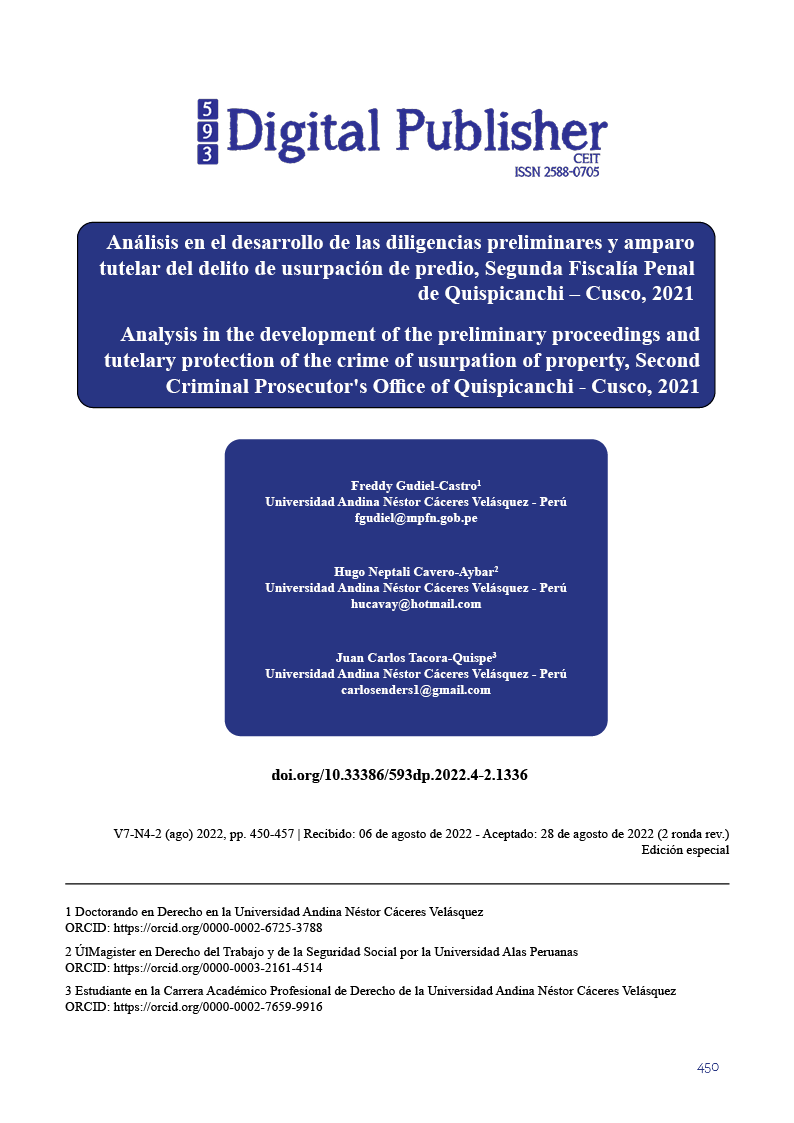Analysis in the development of the preliminary proceedings and tutelary protection of the crime of usurpation of property, Second Criminal Prosecutor's Office of Quispicanchi - Cusco, 2021
Main Article Content
Abstract
The objective of this research is to analyze the development of the preliminary proceedings and tutelary protection of the crime of usurpation of property, Second Criminal Prosecutor's Office of Quspicanchi - Cusco, 2021. For this, the qualitative paradigm paradigm was used, which is of a descriptive method documentary, basic type and descriptive level; As for the sample, there were scientific articles, books, web portals, jurisprudence and doctrine regarding our research topic; that is, for data collection, the bibliographic review was used. Regarding the results: the preliminary proceedings are clearly urgent and urgent acts, and this is done before the knowledge of a criminal (fiscal) news; It is important to mention that the preliminary proceedings guarantee the success of an investigation and the probable cause of bringing those responsible to trial. This concluded that: It was possible to analyze the development of the preliminary proceedings and tutelary protection of the crime of usurpation of property; this result that the investigated can request the amparo action, this for the safeguarding of his constitutional right to property. However, this right may be suspended if required by national security or public necessity.
Downloads
Article Details

This work is licensed under a Creative Commons Attribution-NonCommercial-ShareAlike 4.0 International License.
1. Derechos de autor
Las obras que se publican en 593 Digital Publisher CEIT están sujetas a los siguientes términos:
1.1. 593 Digital Publisher CEIT, conserva los derechos patrimoniales (copyright) de las obras publicadas, favorece y permite la reutilización de las mismas bajo la licencia Licencia Creative Commons 4.0 de Reconocimiento-NoComercial-CompartirIgual 4.0, por lo cual se pueden copiar, usar, difundir, transmitir y exponer públicamente, siempre que:
1.1.a. Se cite la autoría y fuente original de su publicación (revista, editorial, URL).
1.1.b. No se usen para fines comerciales u onerosos.
1.1.c. Se mencione la existencia y especificaciones de esta licencia de uso.
References
Campos Barranzuela, E. (2018). ¿Qué son las diligencias preliminares?, por Edhin Campos Barranzuela. https://lpderecho.pe/diligencias-preliminares-edhin-campos-barranzuela/
Catillo Cordova, L. (2006). El derecho de propiedad como objeto de protección del proceso de amparo. Normas Legales.
Chanamé, R. (2009). Comentarios a la Constitución (4ta. Edic). Editorial Jurista Editores EIRL.
Codigo Penal. (1991). Decreto Legislativo No 635. 08 de abril del 1991.
Congreso de la República. (1993). Constitución Política del Perú. Diario de Oficial el Peruano.
Engels, F. (1996). El origen de la familia, la propiedad privada y el Estado. Editorial Fundamentos.
LP-Pasión por el Derecho. (2021). Amparo: características, derechos protegidos, tipos y procedimiento. LP-Pasion Por El Derecho. https://lpderecho.pe/amparo-caracteristicas-derechos-protegidos-tipos-procedimiento/
Naciones Unidas. (1994). Familias: Tipos y Funciones. Materiales de Trabajo, Infancia y Familia. Ministerio de Asuntos Sociales.
Pipes, R. (1999). Propiedad y Libertad. Dos conceptos inseparables a lo largo de la historia.
Sagan, C. (1997). Los dragones del eden. Especulaciones sobre la evolución de la inteligencia humana. Editorial Planeta de Agostini S.A. http://revistas.unal.edu.co/index.php/revfacmed/article/view/27227
Savigny, M. (1845). Tratado de la Posesión según los principios de Derecho Romano. Imprenta de la Sociedad literaria y Tipografica.
Sepulveda Soto, A. (2019). La usurpación, como delito de acción privada, tipificado en el código orgánico integral penal, genera incertidumbre en su procedimiento, volviendo ineficaz la pretensión del ofendido debido al efecto de la prescripción del delito [Universidad Laica Vicente Rocafuerte De Guayaquil]. http://repositorio.ulvr.edu.ec/bitstream/44000/1191/1/T-ULVR-1300.pdf
Sotomayor savedra, L. E. (2022). Atribución de hechos en las diligencias preliminares. LP-Pasion Por El Derecho. https://lpderecho.pe/atribucion-hechos-diligencias-preliminares/#:~:text=Las diligencias preliminares constituyen un,materiales de su comisión e
Tribunal Constitucional. (2003). Exp. No0008-2003-AI/TC. 11 de noviembre del 2003. https://www.tc.gob.pe/jurisprudencia/2003/00008-2003-AI.html
Tribunal Constitucional. (2004). Exp. No 0031–2004–AI/TC. 23 de septiembre del 2004.
Von Ihering, R. (2004). Teoría de la posesión. El fundamento de la protección posesoria. Editorial Reus.


.JPG)

